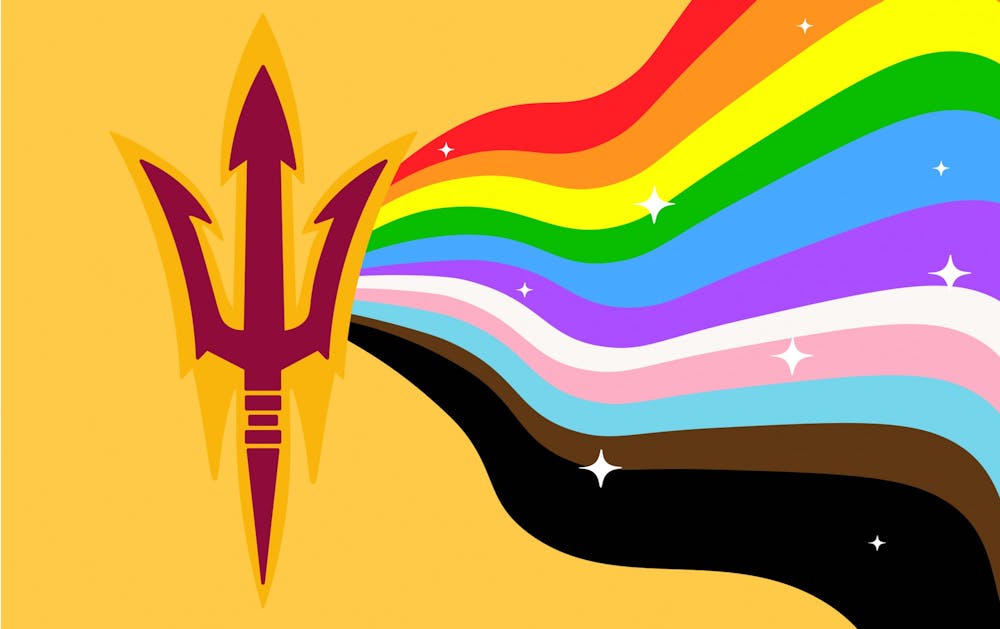Leaders in the Gay, Lesbian and Straight Education Network Phoenix chapter say that LGBTQ+ clubs, open allyship and inclusive policies in Arizona schools and universities are beneficial to LGBTQ+ students and faculty.
Since ASU's charter was adopted in 2014, which states the University is "measured not by whom it excludes, but by whom it includes and how they succeed," ASU has slowly worked to actualize the statement for the LGBTQ+ community, including forming multiple inclusive clubs, increasing engagement and authoring some inclusive guides and policies.
Aimed at improving educational experiences for LGBTQ+ students nationally, GLSEN Phoenix describes itself as "a grassroots initiative, working locally in our community to ensure safe schools for all students, regardless of sexual orientation and gender identity."
The need for inclusive spaces
Joe Golfen, the communications coordinator for GLSEN Phoenix, said in an interview that "having a (Gay-Straight Alliance or Gender-Sexuality Alliance) club or some kind of support system is really important to... students because it... provides a safe space that they may not receive at home or (in) the rest of their education."
Madelaine Adelman, a professor at ASU’s School of Social Transformation and co-founder of GLSEN Phoenix, said that the existence of these clubs is a signifier for LGBTQ+ students that their campus is an accepting environment for them, even if they do not actively attend meetings or claim membership in another way.
ASU has a wide range of LGBTQ+ specific clubs offered to students, including a STEM-specific group, an organization for graduate students and a group intended for W. P. Carey students among others.
Adelman noted that LGBTQ+ clubs on college campuses can be a "launching point" for some to seek personal resources while also providing a space to nurture their leadership skills and advocate for change.
"I know, for example, that at ASU, there was a group of trans students primarily and their allies who organized to change some policies at ASU," Adelman said. "For example, a trans student could have their correct name show up on Canvas or on Zoom, things like that."
The University has taken numerous steps to advance overall campus inclusion through its Student and Cultural Engagement department, which created a faculty guide for transgender student inclusion in the classroom in 2017.
Introduced in 1978 and revised in 2020, ASU also has a Prohibition Against Discrimination, Harassment and Retaliation policy, which outlines how faculty and students can submit formal complaints of discrimination or harassment to the University.
However, sensitivity training and virtual name changes can only do so much. Transgender students continue to face a range of individualized forms of discrimination on a routine basis, particularly in day-to-day interactions with peers and faculty and in healthcare.
READ MORE: Despite training and resources, transgender students still face healthcare barriers on campus
The Office of Inclusion and Community Engagement is another way ASU has pushed for tolerance on its four campuses, offering additional resources to students, faculty and staff for support.
The office has a Committee for Campus Inclusion, a faculty advisory group to the provost that "promotes a positive, harmonious campus environment that celebrates individual and group diversity, promotes individualism, provides information to the campus community, and resolves issues in such a manner as to respect all persons and their dignity," according to its mission statement.
READ MORE: LGBTQASU: Queer life and visibility at Arizona State University
Developing diverse faculty and curriculum
Openly LGBTQ+ educators are "modeling being authentic with themselves to all of their students," Adelman said, regardless of their students' sexual or gender identity.
"The kind of legitimacy and validation that someone who is openly gay or openly trans on campus at a high school or a university… brings to a person's identity is kind of priceless," Adelman said.
To allow educators to teach as their authentic selves, Adelman says the most crucial measures are for the institutions they are employed by to implement anti-discrimination policies, sensitivity training and an expansive curriculum.
"You can have all of these people and… allies and accomplices, but if you're also not giving people the formal education they need… then you're really missing out on a very important component, because inclusive curriculum does the same things that having a GSA in a school does," Adelman said. "Emotional health is more positive and educational outcomes are also better."
Multiple courses covering sexuality and gender in various facets of life are offered to students at ASU, ranging from a Diversity and Oppression in a Social Work Context course to an Identity, Performance, and Human Communication course.
The University offers three undergraduate programs that deal directly with studies related to sexuality and gender: the Social and Cultural Analysis degree, the Women and Gender Studies degree and the Lesbian, Gay, Bisexual and Transgender Certificate.
Adelman said ASU faculty who formed the certificate "wanted to create a learning environment for students to explore the histories and cultures of LGBT people, and in doing so, examine varied strategies and tactics used to constrain or liberate people based on sexual orientation and gender identity."
Reach the reporter at stellefs@asu.edu and follow @samtellefson on Twitter.
Like The State Press on Facebook and follow @statepress on Twitter.
Sam Ellefson is the Editor of State Press Magazine, leading a team of writers, editors and designers in creating four print issues each semester. Sam is a senior getting dual degrees in journalism and film studies and is pursuing an accelerated master's in mass communication at ASU.




